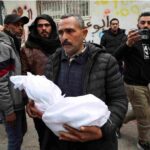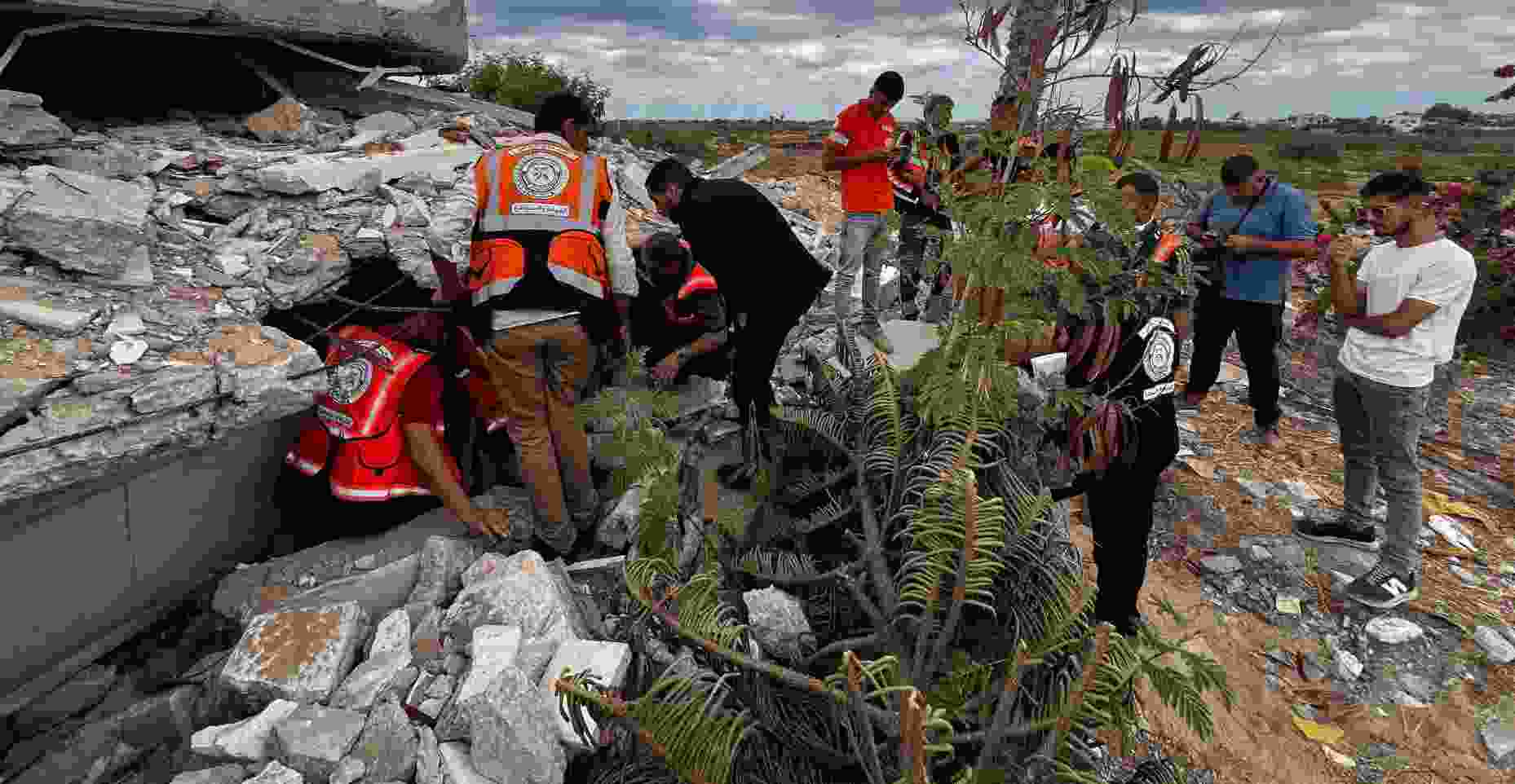
Using hand tools and their own hands, people begin the immense task of trying to find the remains of their loved ones.
Ghali Khadr spent two days begging his parents to flee with him to southern Gaza, warning them that it was too dangerous to stay. His father, known for his stubbornness, refused. The argument never ended – an Israeli airstrike hit his father’s house, burying him under rubble.
On Sunday, two days after the ceasefire was announced, Khadr returned to search the ruins of his parents’ home. He spent the day sifting through shattered concrete and twisted metal for any sign of them. All he managed to find were some skull fragments and hand parts.
Ghali Khadr. , Amjed Tantesh/The Guardian
“My father, a retired ambulance driver, was known for his willpower and patience. He knew no fear and was always optimistic,” said Khadr, 40, from Jabaliya in northern Gaza.
Khadr took his parents’ remains to the cemetery, but discovered that it too had been destroyed. He decided to bury them next to the few graves that were still intact.
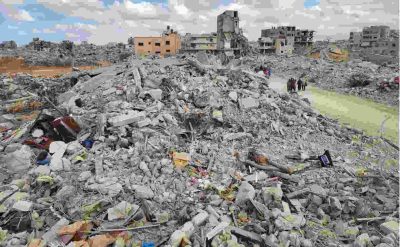 The destruction left by the Israeli offensive in Gaza City. | Amjed Tantesh/The Guardian
The destruction left by the Israeli offensive in Gaza City. | Amjed Tantesh/The Guardian
Like Khadr, thousands of Palestinians have returned to northern Gaza since Friday’s ceasefire with an arduous task ahead: searching for loved ones killed weeks or months earlier in Israeli airstrikes and whose bodies are buried beneath the rubble.
Gaza’s civil defense agency estimates that the bodies of around 10,000 people are trapped under rubble and collapsed buildings. The halt to the fighting gave the ambulance service the chance to finally begin searching for the dead and giving their families a chance to gain closure.
The task that rescuers face is immense, considering the estimated amount of 60 million tons of rubble spread across the territory.
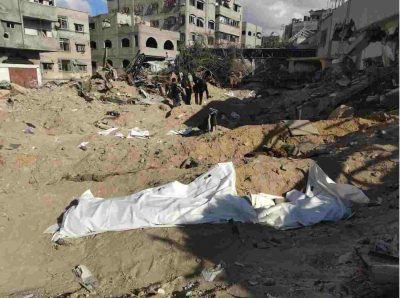 Bodies unearthed by Israeli excavators in the Sheikh Radwan neighborhood in northern Gaza. | Amjed Tantesh/The Guardian
Bodies unearthed by Israeli excavators in the Sheikh Radwan neighborhood in northern Gaza. | Amjed Tantesh/The Guardian
Most roads were destroyed or blocked by debris. Civil defense agents are short of heavy equipment and have to use pickaxes and sledgehammers to clear a path between collapsed buildings. Rescue teams need to move slowly. The rubble is also full of unexploded bombs and munitions.
“At first, we are focusing on collecting the corpses scattered in the streets to preserve what is left of them, especially with the presence of stray dogs that have been attacking the bodies,” said Khaled al-Ayoubi, 64, head of civil defense in northern Gaza.
Other rescuers are forced to dig through the rubble with their bare hands. So far, they have recovered only a fraction of the 10,000 missing people and have not yet begun searching the ruins of multi-story buildings.
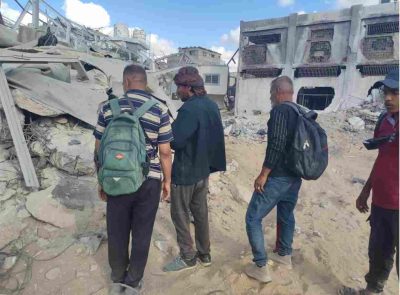 People search for the remains of their loved ones in the Sheikh Radwan neighborhood in northern Gaza. | Amjed Tantesh/The Guardian
People search for the remains of their loved ones in the Sheikh Radwan neighborhood in northern Gaza. | Amjed Tantesh/The Guardian
If Israel allows heavy equipment to enter in the coming days, all the bodies should be recovered within six months to a year, said Dr. Mohammed al-Mugheer, 38, director of humanitarian support and international cooperation at the Gaza civil defense agency.
Many residents of northern Gaza cannot bear to wait that long. They began returning to their dilapidated homes to search for their loved ones on their own.
Yahya al-Muqra, 32, from Jabaliya, believes his brother, Sharif, is dead. He lost contact with him after an Israeli airstrike on their home on July 25. He managed to visit the destroyed building but found no sign of Sharif’s body.
“We went to check the area, but we found no trace of him, as if he had disappeared, the house and everything around it had turned into rubble,” said Muqra. “Witnesses said they last saw him near the house.” His brother suffered from epilepsy, and he fears that even if the airstrike hadn’t killed him, he would have died without his medication.
On Sunday, Muqra finally had time to look for his brother, but working alone, he was unable to find any sign of him.
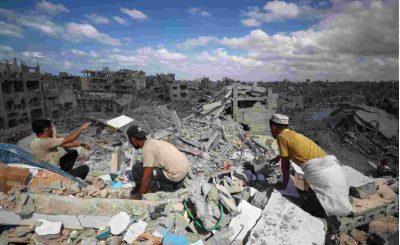 Palestinians sift through the rubble in Khan Younis. | Omar Al-Qattaa/AFP/Getty Images
Palestinians sift through the rubble in Khan Younis. | Omar Al-Qattaa/AFP/Getty Images
“I was hoping to find something that would prove Sharif was there, a piece of clothing, any trace. We really need heavy machinery to search under the rubble, but those machines are not available,” he said.
For many families, the pain of not knowing where, when or how their loved ones died is immense. They spent months exiled from their homes, waiting in limbo for the chance to find at least a fragment of those they lost, something to say goodbye to.
Providing families with this opportunity is what motivates Gaza’s first responders, who work hard in the blazing sun while anxious families wait by their sides.
“Families feel that recovering the bodies of their martyrs is a way of honoring them and preserving their souls, and this reassures them that their loved ones truly became martyrs and are no longer alive,” said Fadi al-Salibi, 35, a civil defense worker.
Muqra hopes the next few days will reveal something about her brother’s fate. With the cemeteries in his neighborhood destroyed, he plans to bury Sharif in the garden of his home.
“My heart is broken that my brother has not yet been buried. Even a single bone would allow us to bury him and feel some relief,” he said.
Originally published by The Guardian on 10/12/2025
By Seham Tantesh in Gaza and William Christou in Jerusalem
Source: https://www.ocafezinho.com/2025/10/13/meu-coracao-esta-partido-palestinos-procuram-seus-mortos-nos-escombros-de-gaza/

